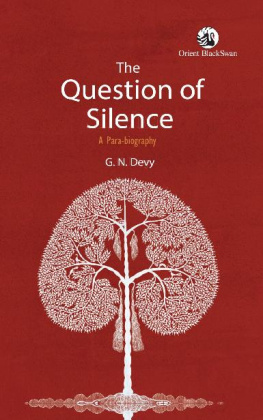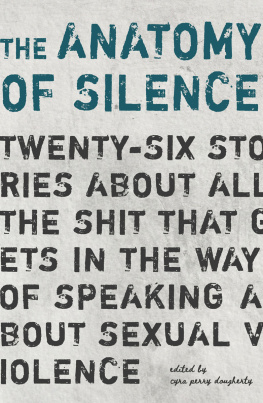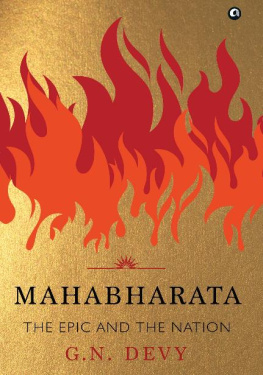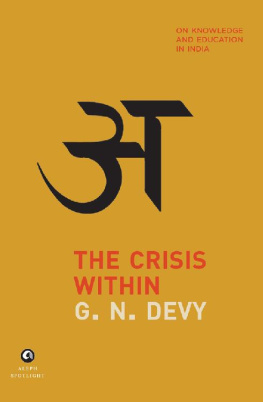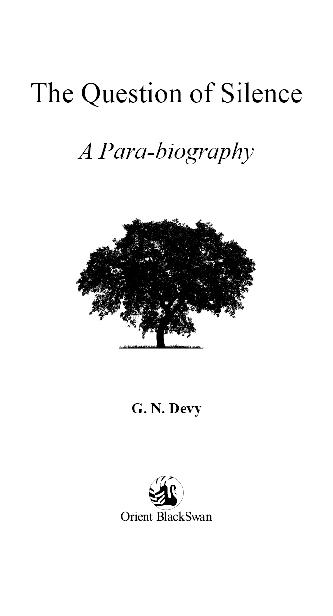
THE QUESTION OF SILENCE: A Para-biography
ORIENT BLACKSWAN PRIVATE LIMITED
Registered Office
3-6-752 Himayatnagar, Hyderabad 500 029, Telangana, India
e-mail: centraloffice@orientblackswan.com
Other Offices
Bengaluru, Bhopal, Chennai, Guwahati,
Hyderabad, Jaipur, Kolkata, Lucknow, Mumbai,
New Delhi, Noida, Patna, Visakhapatnam
Orient Blackswan Private Limited 2019
First published by Orient Blackswan Private Limited 2019
eISBN 978-93-5287-917-5
e-edition: First published 2020
Published by
Orient Blackswan Private Limited
3-6-752, Himayatnagar, Hyderabad 500 029, Telangana, India
e-mail: info@orientblackswan.com
All rights reserved. No part of this publication may be reproduced, distributed, or transmitted in any form or by any means, including photocopying, recording, or other electronic or mechanical methods, without the prior written permission of the publisher, except in the case of brief quotations embodied in critical reviews and certain other noncommercial uses permitted by copyright law. For permission requests write to the publisher.
For
Rashmi and Ishaan
Table of Contents
Publishers Acknowledgements
For granting permission to use copyrighted material in this volume, the publishers would like to thank the following:
Rita Kothari, and Oxford University Press, for a segment in Silence on the Horizon, originally published in the essay Changing Script by G. N. Devy, in A Multilingual Nation: Translation and Language Dynamic in India , edited by Rita Kothari (New Delhi: Oxford University Press, 2018).
Rashmi Poddar, Jnanapravaha Mumbai, for Language Diversity, a lecture by G. N. Devy at Jnanapravaha Mumbai, 22 November 2010; and Rupalee Burke, for her transcription of the lecture.
Rupalee Burke, for her transcription of Aesthetics for our Time, the Ashok Ranade Memorial Lecture by G. N. Devy at National Centre for Performing Arts, Mumbai, 10 December 2013.
Gulan Kripalani, Citizens for Peace, for Language, Culture, Tribal Struggles and Indian Democracy, a conversation with Dilip DSouza, G. N. Devy and S. Parasuraman at PeaceTalks, Mumbai, 21 January 2011.
Chitra Padmanabhan, and The Hindu , for Multilingualism and Cultural Pluralism, originally published as We are talking more using fewer words, in The Hindu , 3 September 2013.
Kiran Singh, for More Intuitive, Less Rational, an interview of G. N. Devy on 25 November 2014.
Yagnesh Dave, for And We Come to a Standstill, originally published in Gujarati as Ganesh Devy Sathe Vartalap [A Conversation with Ganesh Devy], in two parts, in the Gujarati periodical Navneet Samarpan (April 2014: 5274 and May 2014: 4684); and Rupalee Burke, for the English translation.
Rossella Ciocca, and Anglistica AION , for Beyond Cultural Aphasia, originally published as Beyond Cultural Aphasia: A Conversation with Ganesh Devy on Indian Adivasis, in Anglistica AION 19(1): 2535, 2015.
Shirley Chew, and Moving Worlds , for Baroda, originally published as Baroda: What a City!, in Postcolonial Cities: South Asia, Moving Worlds: A Journal of Transcultural Writings 13(2): 2434, 2013.
Acknowledgements
I am beholden to Shiv Visvanathan and Vidya Rao for commenting on an earlier larger and a more chaotic version of the text. Their criticism helped me in reducing it to a half of its original so as to make it less inaccessible.
If it is not misunderstood as a sign of senility, I would like to mention Dastak. She joined my family when she was a two-week-old pup. For years together she was an inalienable part of my life. In March 2016, Surekha and I decided to give up our city of residence in Gujarat, where we had lived for the previous four decades, and to move south. The month of March that year was unusually hot. Dastak could not have withstood it. And she did not. We arrived in our new town of residence after having to bury her on the way in one of the Sahyadri hills. Her absence led me to think of silence more gravely than ever before. She would have wordlessly understood most of my thoughts compressed in these pages. I think of her.
My life has been a series of unfinished conversations. I think of all those now eternally silenced friends and mentors whose conversations have made me what I am: Suresh Joshi, Robert Welch, Arun Kolatkar, Dilip Chitre, Vijay Tendulkar, Narayanbhai Desai, Mahasweta Devi, Geoffrey Davis, and U. R. Ananthamurthy. Alas, I cannot convey my gratitude to them.
Readers not familiar with the various cultural struggles I have undertaken at different stages in my life and the entire saga of the vast languages survey will no doubt find this work chaotic and a dark text. I do not think any publisher would have thought of publishing it in the present form, despite my having written or edited close to some eighty books. I thank Vidya Rao and Orient BlackSwan for being indulgent to me in taking the risk of bringing out this text. The manuscript I had imagined would be this book and the text as it is now are as different as a block of coal and a diamond. The credit for the transformation goes to Moyna Mazumdar who brought her exceptionally intuitive skills of copy-editing to my help. I thank her.
The Question of Silence
As I write this in 2016, I am thinking of 1982, Netherlands and Marleen Gorris. Gorris, accidently pushed into directing a film, makes her debut. Cox Habbema is brought in to play the role of a court psychologist. Her challenge is to fathom why three complete strangers got together to murder a clothes-boutique proprietor. These three womenan office assistant, a housewife and a waitresshave been the most unlikely of killers. The man they have killed is unknown to them. Was it their suppressed rage against patriarchy? Was it their existential angst as in Albert Camus Outsider ? The film follows the process of investigation, criminal and psychological. It is clear that the crime is committed by them. The more important part of the film is what they hold back in their shared silence. Gorris controversial debut film, which has become an iconic feminist classic, was titled A Question of Silence . The genius of Gorris has since then been recognised worldwide as being disturbingly visionary. The question she raised through her film was: Arent the stories of the three strange women really a single and universal narrative? The plot does not provide any answers. Having raised the question, it remains silent.
... I gave commands
Then all smiles stopped together. There she stands
As if alive ...
This is how the protagonist of Robert Brownings dramatic 1842 monologue My Last Duchess describes the silence he orders for the gorgeous duchess. Drawn on probably the fifth Duke of Ferrara in sixteenth-century Italy, he considers honour to be above love. It is his honour that is to be protected by forcing her into an eternal silence. It is the same order of silence that Ms. Benade of Vijay Tendulkars Silence! The Court is in Session has to face, though the twentieth-century context of Tendulkars Marathi play could not have featured a medieval Italian torture-trap as in Brownings chilling poem.





